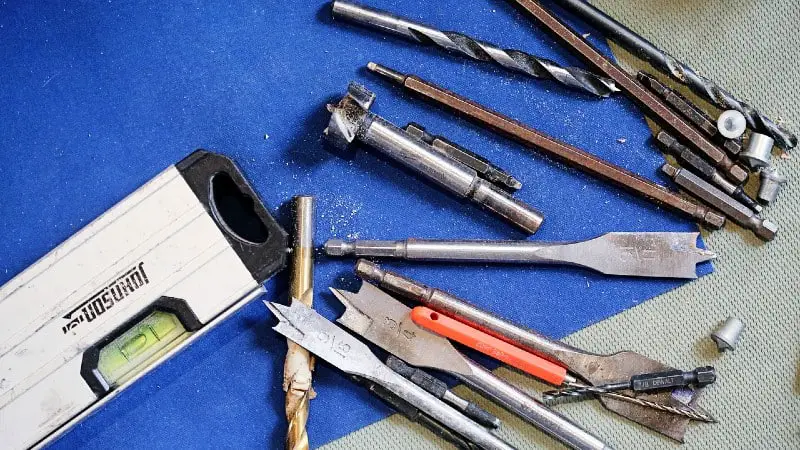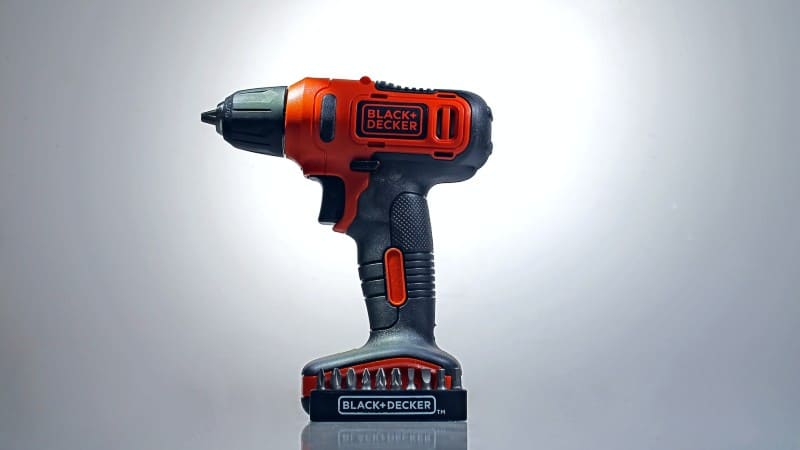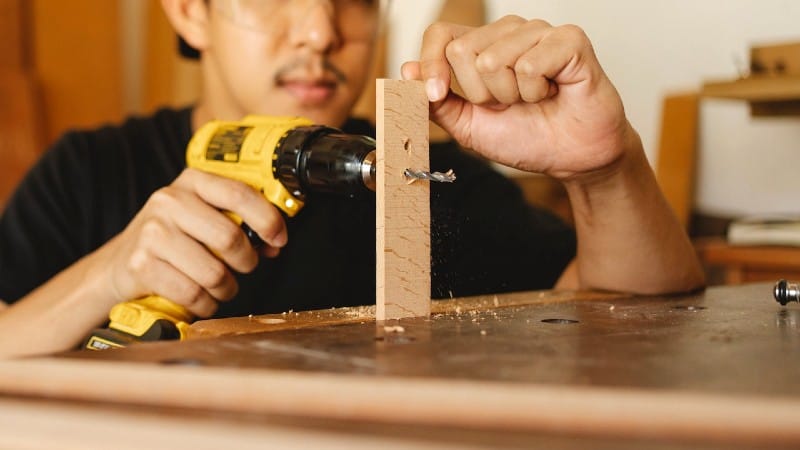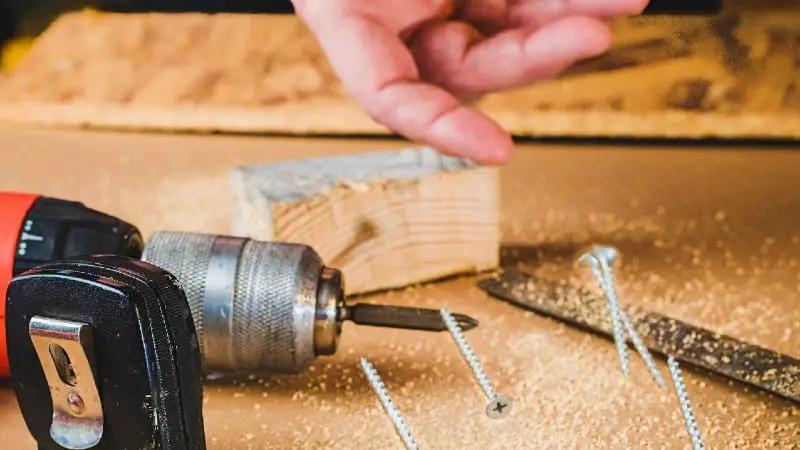When you’re a DIYer, it’s easy to get caught up in the excitement of a new project and forget about the most basic things. For example, have you ever wondered if drill bits were interchangeable between brands? I know I have! And that’s what I’m going to talk about today:
So, are drill bits interchangeable between brands?
The answer is Yes. However, you must make sure that the drill bits are not too big for the chuck of the drill you’re using. Also, you need to make sure that the bit was intended for use by that type of drill: Push drill and SDS drill bits are not compatible with the chucks of normal drills.
When you’re preparing to do a project, it pays to shop around for the best price on drill bits. You also don’t want to spend money on something that won’t work well. So, let’s go into more detail:
Table of Contents
- Can you interchange drill bits between brands?
- Why would you want to interchange drill bits between drill brands?
- Can drill bits made by another manufacturer harm your drill?
- Why not just use a 1/2-inch drill?
- Related Questions
- Final Words … Are Drill Bits Interchangeable Between Brands?
Can you interchange drill bits between brands?
There are many types of drill bits, and they are used for different purposes and materials. While there are some differences between different tool brands and models as far as features and capability, they are basically the same tools.
Another way of asking the question is: Can you use different types of drill bits with different brands of drills (e.g. DeWalt, Bosch, Makita)? Yes, you can. However, there are some limitations. In order to understand them better, we will cover more material:
What is the shank of a drill bit?
The shank is the part of a drill bit that attaches to your power tool. Some bits have round shanks and others are hexagonal, though there are other shapes. The diameter (or size) varies from one model or type of drill bit to another.
What is the chuck of a drill?
The drill chuck is the part of the power tool that holds the bit. You adjust the chuck so that it grips bits of different sizes.
Common drill chucks have jaws that tighten on the bit as you turn them. Some require an external tool to tighten known as a chuck key. Others can be turned without a key.
Most chucks are 1/4-inch, 3/8-inch, or 1/2-inch. These can accept bits with shanks up to the size of the chuck. Also, common drill chucks can also accept hexagonal shanks.
The takeaway from this is that bits with shank sizes that are too large will not work with particular drills. This is dependent on the chuck size of the drill. Also, bits with hexagonal shanks (such as some screwdriver bits and spade bits) are OK to use with most drill chucks.
Which types of drill bits can’t you use with your drill?
Drills are very versatile tools. They can be used for a variety of purposes, such as making holes and driving screws. I wrote another article showing how to use an electric drill as a screwdriver.
The adjustable chuck allows drills to use many bit types with various shank sizes (up to the maximum size of the chuck). However, certain bits are not usable in a common drill chuck. They include:
#1. Bits for push drills – The push drill is a hand tool for drilling holes and doing similar work. You turn the bit by pushing the drill forward into the work. I wrote another article showing how you can make a hole in wood without a drill.
Note: This post may contain affiliate links. If you purchase a product through an affiliate link, I’ll earn a commission, at no cost to you. To find out more, see my full disclosure.
Push drill bits are not designed to be used with ordinary drills: They require special bits—ones that have been made with an eye toward how they will fit into this specific kind of drill. If you try to use one of these bits in your regular electric drill, it probably won’t work very well. This link shows a push drill and push drill bits on Amazon.
#2. Bits for SDS drills – SDS stands for Slotted Drive System. A SDS drill has a powerful hammering action and is used to drill into tough materials such as concrete. The drill bits for this type of drill have slots in the shank that allow them to slide forward in the chuck in order to hammer the material. This type of drill is not designed to use ordinary drill bits. This link shows some bits for SDS drills on Amazon.

Why would you want to interchange drill bits between drill brands?
If you’re new to woodworking, it can be tempting to stick with a single brand of drill bits. After all, it’s easy to get comfortable with a brand that you know works for you and your projects! But there’s a lot of value in being able to use a variety of different brands of bits.
Here are some reasons why:
#1. Price Savings – Interchangeability between brands is a major reason why people want to purchase products from multiple companies. If you can find a brand that offers the same quality as a more expensive one but at a cheaper price, then it’s worth making the switch.
#2. Quality – If you don’t mind using a bit that doesn’t have the same level of quality as your favorite brand, then you can save money by buying in bulk.
#3. Variety – You can use different types of drills for different jobs, so having interchangeable bits means being able to switch between different ones from different brands without having to buy every single one separately.
#4. Ease Of Use – Once you’ve gotten used to using this particular type of bit (and have figured out any quirks or nuances), it will be much easier for you to use it again in the future because your “muscle memory” will already be trained on how best to hold and operate the tool.
#5. Availability – If you’re looking for a particular size or type of drill bit, you may find that only one brand carries it in your area or online.
#6. Desire – You just love tools and want to explore new brands!

Can drill bits made by another manufacturer harm your drill?
When you’re building a new piece of furniture, or just want to make a few holes in your wall for a new light fixture, it can be tempting to grab a drill bit from another manufacturer.
But can using bits made by another company really ruin your drill? No, not if you pick the right bit for the job!
When choosing what size bit to use, think about the power of your drill: If you have a small drill and try to use a large spade bit, for example, the motor might not be able to generate enough power to make the hole easily (Note: The spade bit is shaped like a “paddle” and is used to cut out holes. This link shows a large spade bit on Amazon).
Also, choose a quality brand. The better quality your tools are, the longer they’ll last. If you buy cheap tools, they won’t last as long and will break more easily.
The quality of tools will vary between manufacturers. Different companies use different materials when manufacturing their products, which can affect how well they hold up over time and how much wear they experience while in use. In general, a higher-quality brand will last longer and perform better than one made by a lesser-known company. I wrote another article about sparks from a corded drill.

Why not just use a 1/2-inch drill?
In an earlier section, we mention that drill chucks commonly come in 1/4-inch, 3/8-inch, and 1/2-inch sizes. They are very versatile tools and can accept numerous accessories. In another article I showed how an electric drill could be used as a sander.
Also, we said that drills could accept bits up to the chuck size. So if your drill has a 1/2-inch chuck, then it accepts bits with shank diameters from less than 1/4 -inch all the way up to 1/2-inch.
So, doesn’t that make the 1/2-inch drill more versatile than drills with smaller chucks? Why would anyone want to use smaller drills?
Actually, there are many reasons. Here are some of them:
#1. You need to get into tighter spaces where using a larger drill bit is not possible.
#2. You might not have a 1/2-inch drill.
#3. You might not want to buy a bigger drill just to use it once or twice.
#4. Larger drills can be bulky, weigh more, and be harder to manage.
#5. In general, smaller drills cost less. I wrote another article with 14 ways drill accessories can increase your productivity.

Related Questions
Are drill bits universal?
A universal drill bit is designed to drill through many different types of materials such as wood or brick. However, not all bits are created equal; some are specially made for drilling in certain materials like metal while others will do a better job boring into plastic. This link shows universal bits on Amazon.
What is a drill adapter for larger bits?
This drill bit adapter lets you use larger bits that won’t fit into the drill’s chuck. This adapter starts with a drill shank and ends with a chuck for the larger bit. It is often used with impact drivers as they do not have standard drill chucks. This link shows a drill adapter on Amazon.
Final Words … Are Drill Bits Interchangeable Between Brands?
So, can you interchange drill bits between brands? It’s not a bad idea. The chances are that you’ll have a lot of different drill brands in your toolbox. You might even have more than one cordless drill that uses different batteries. In addition, many woodworkers have at least one corded drill as well as a cordless model.
So, why would you want to interchange drill bits between drill brands? You probably don’t want to buy the same size bit over and over again. It’s just not cost-effective!
Did you enjoy reading this article? If so, you might be interested in visiting my Pinterest profile. It contains pins about DIY & Crafts, Woodworking, Tools, Projects, Hardware, and much more.

